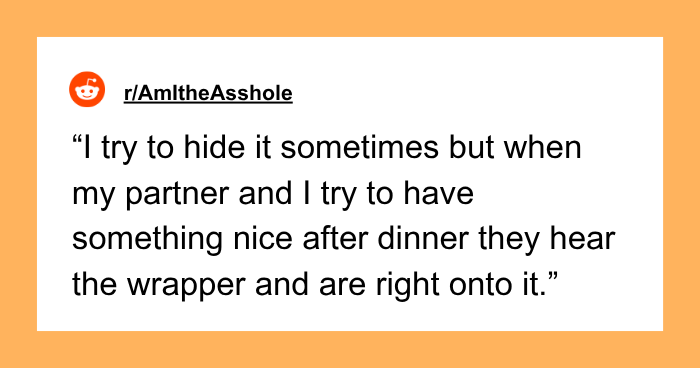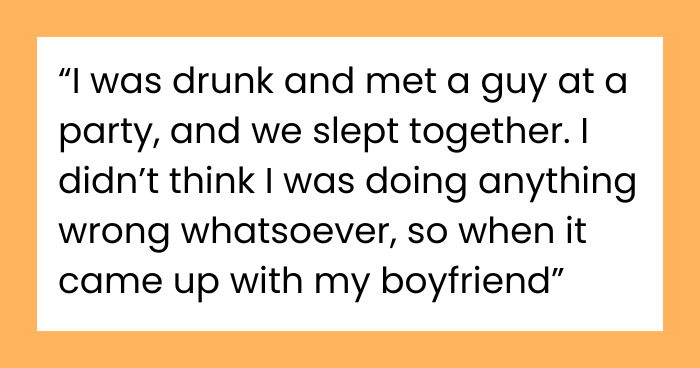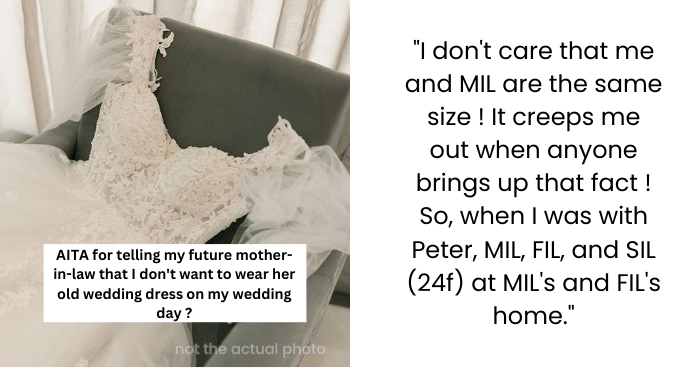Mom Forces Kids to Buy Their Own Snacks – Daughter Snaps After Being Denied a Treat
Because there were three hungry teens in the house, one parent made a difficult choice: the teens will have to pay for their own snacks if they want to eat junk food. The new rule makes sense since each child makes at least $150 a week from part-time work. The boys agreed, learnt how to make a budget, and now they keep their snacks in different places. But what about the daughter? I’m angry. She says it’s not fair and that her parent “wants her to starve.” Now the parent’s entire family is involved. Some of them are on their side, while others call them selfish.
This AITA post that went viral on Reddit isn’t just about snacks; it’s also about setting limits, being a good mom, and being responsible with money. Does it seem fair to expect teens who work to buy treats that aren’t necessary? Or is it smart to draw a line between foods that your body needs and foods that you want? Take a closer look at a debate that has even grandparents split.
Teens can eat like a plague of locusts, but this mom came up with nifty solution
She told her three teens that they’d have to buy their own junk food from now on






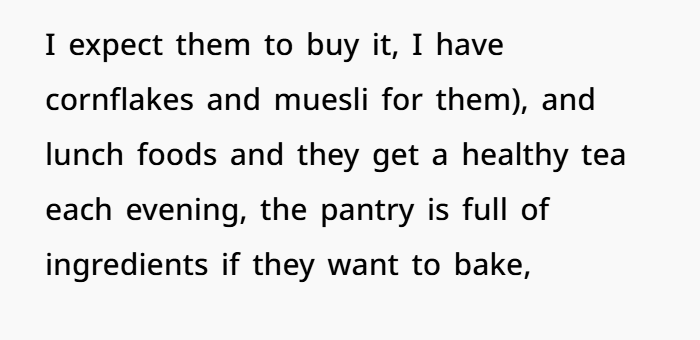

It costs a lot to raise kids, especially when they eat like professional athletes. A parent on Reddit says that instead of buying junk food for the house, they should make their kids, who all have jobs and money, buy their own.
The choice wasn’t made at random. The parent says that they give their child full meals with all the items they need for breakfast, lunch, and dinner. Every night, they serve healthy home-cooked meals and breakfast foods like cereals, breads, fruit, and sandwich fixings. What’s no longer stocked for you automatically? The sweet cereals, chips, soft drinks, and snack cakes that were gone in hours after they got there.
Instead, the kids have to make their own budgets for these things, and surprisingly, two of the three kids are okay with it. The boys say they now understand how expensive prepared snack food can be. To keep bugs out, they now keep their snacks in covered tubs in their rooms and put labels on their drinks in the fridge. Everybody is happy with the deal except the daughter.
Do you need junk food?
Let’s talk about one of the main points: the daughter says that making her buy her own snacks is the same as not giving her any food at all. But this doesn’t hold up when looked at more closely. No one is not giving her food. It is made clear by the parent that free, healthy food is still available. There is food in the fridge and cupboard, but not “junk.” There is muesli, cornflakes, bread, and meal ingredients.
From the daughter’s point of view, it’s typical for people in Western homes to think that junk food means comfort and fairness. But is it okay to have a bag of Doritos? Or something fancy? Harvard Health’s nutritionists say that too much junk food is neither important nor healthy, and that teaching kids that they should only eat it in moderation is not mean, but responsible parenting.
When a parent says, “If you want Coke and chips, use your own pay cheque,” they’re not denying their child food; instead, they’re teaching them how to manage their money and set good priorities.
Smart or Strict? That’s the lesson on budgeting.
There is money for the teens in this house. All three of them have part-time jobs that pay at least $150 a week. This is money that many families spend on clothes, subscriptions or takeaway. You want them to use some of that for their own cravings? In no way is that abuse. That’s being responsible with money in the real world.
In fact, financial experts say that teaching kids how to make a budget early on is one of the best ways to get them ready for adulthood. A 2022 article from NerdWallet tells parents to make plans for their kids to help pay for their own wants instead of needs. This doesn’t mean renting to a 16-year-old. Getting their own snacks, though? Completely makes sense.
When parents let teens choose their own junk food, they take away the “scarcity” factor that often leads to bingeing. The kids now have choices, and two of them have been able to adjust without any problems.
What makes the daughter’s reaction more painful
Then why is the daughter mad? The parent thinks that part of it might be a sense of privilege or being picked on. Her friends and maternal grandma are on her side, which may have made her feel even worse about the idea that her parent is being too mean or not caring enough.
In families, what people think is fair can sometimes be more important than what is true. It doesn’t matter if she gets the same amount of food or more; what matters is that she feels cheated out of something she used to get without having to work for it. That loss of comfort can feel like punishment, especially when you’re a teenager and still learning how to control your emotions.
Gender relations can also come into play. Girls are often taught to connect food with comfort, which could explain why she reacted more strongly than her boys. Peers might also want her to have the same brand of snacks, or she might feel bad about being the only one who is “not allowed” to have them unless she buys them herself.
Even though those thoughts are real, they don’t mean that the rule is wrong. They’re just showing how uncomfortable it is to move from being a child to being an adult.
As a parent, is this a win?
A lot of people on Reddit and parents in similar cases praised this parent’s approach. They’re not separating from their kids. When they say, “If you earn your own money, you can take responsibility for your non-essential preferences,” they make it clear what they expect from you.
It’s also important to note that the parent hasn’t turned this rule into a threat. The kid isn’t getting in trouble. They still give the kids full meals and let them bake with things from around the house as long as they share. Think that junk food should be free and available to everyone. That’s the only “loss” here.
In the Reddit thread, other parents shared similar experiences, saying that snack food disappears quickly in homes with teens and that letting teens handle their own stash often leads to healthier choices and better budgeting.
In the comments, readers seemed to agree that the mom wasn’t being a jerk and that the daughter was being delusional with her demands
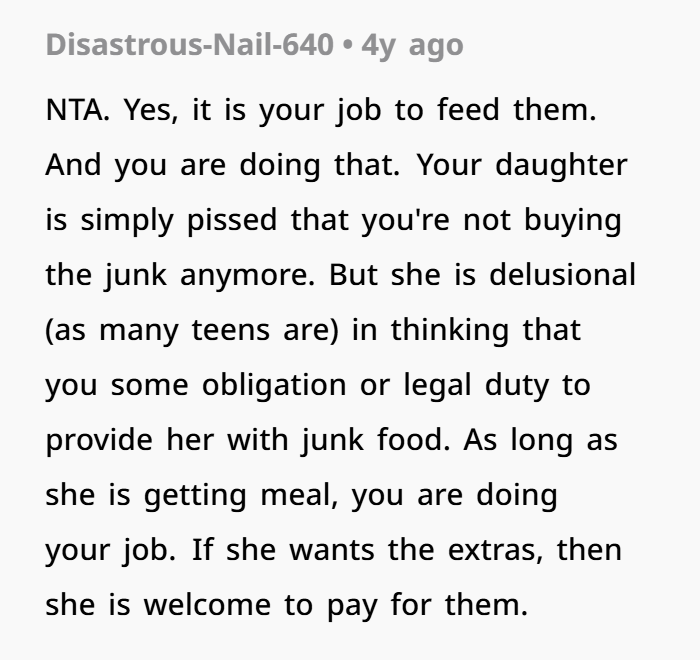



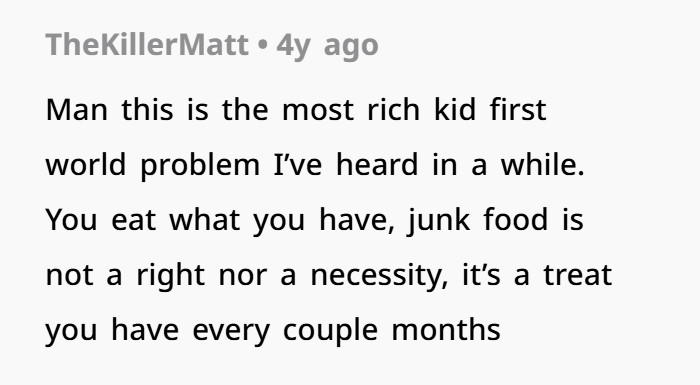
Not the jerk
A key part of becoming an adult is teaching teens how to budget, set boundaries, and value the things they buy. And doing it in a house where there is still plenty of food, everyone shares dinner, and no one goes hungry? That’s what we call setting clear boundaries.
It’s not about snacks. It has to do with being responsible, having freedom, and not letting guilt get in the way of being a good parent.

